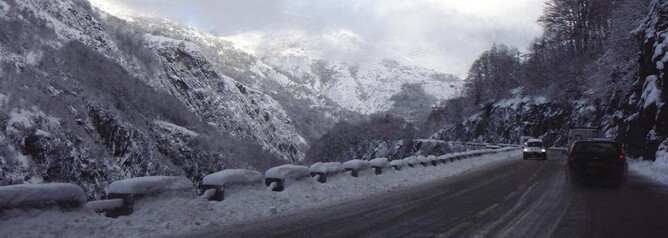There are many singular days we could focus on, as there are many aspects to our ministry here in France: days spent with campers and colleagues during our camps (about two to three months/year), days spent alone or with a co-worker building or fixing things around camp (about four months/year), or days spent working at the resort alongside people who don’t know or who have never heard the truth about Jesus (about five months/year). While our favourite thing to do is have conversations with people about their walk with Christ, this doesn’t happen everyday and there are many other things that happen (and need to happen) before we’re able to have these conversations.
By ‘need to happen’ we’re not saying that God cannot or does not allow these conversations to happen out of the blue with random strangers. What we have found, however, is that here in France people do not usually open up AT ALL about anything serious until there is a real relationship. Religion (I would argue that Christianity is not a religion but a faith, but that’s another article!), money and politics are known as the ‘big three’ subjects that you don’t discuss in France. Evidently these topics do come up (and we try to make sure they do), but not straight away.
As I’m writing this, Candide is having two or three ladies over for a knitting get-together, which is part of her mission field and something she has been planning to do since we moved to this area (there are five neighbour families with children of Jack’s and/or Henry’s age). Of these ladies, one is from a Turkish background (and from a Muslim background, though not necessarily practising now) and the others have French/non-religious backgrounds (though when digging a bit deeper you find out that most have had some kind of Catholic input, whether directly or via their parent
or grand-parents).
Whether a ‘full-time missionary’ or a ‘full-time something else’, the mission field is everything and anything we do as Christians. Obviously our mission field here in France is quite different from your mission field back in Australia. Since we have shared about the camp ministry on previous occasions, we’ll share about what happens for us during winter when we’re not at camp.
One of the main differences between the mission field in France and the one back in Australia is that most French people of 20-40 years of age have no concept of Who Jesus is, as most of these people have not had any Christian upbringing or input. (Traditional French families used to attend Catholic services and have their children go through catechism. Due to the lack of reality of what was preached (many Catholics don’t take the Bible as fact, but as stories), the children who went to church twenty or thirty years ago now do not attend and don’t see the need to send their children to church.)
Maybe due to the climate or the culture or what is taught in schools, the French generally don’t believe in many things that they cannot see, despite taking the evolution dogma as fact. Eastern religions like Buddhism or Hinduism are not that trendy in France. Most people just believe that we come from nothing and that there is nothing beyond death.
Along with being in France (with all that entails spiritually and culturally) the area we live in is very touristic and most people here make a living on enabling tourists (often quite wealthy people from Western Europe and/or the UK) to have a pleasurable time — whether on ski slopes, out hiking in the mountains, or riding bikes over mountain passes. We live in a big village in the country about an hour away from a big city, which means that the quality of life (air, water, lifestyle) is quite high and the focus is very much on having a good time while you can in the beautiful surroundings. This area doesn’t really have much unemployment, and things like poverty and immigration are just issues you hear about in the news or when you go to a big city. This makes the ‘need’ for a saviour largely absent since, for most, life is as good as it can get. The reality of life does still reappear when an avalanche kills someone’s father, or a skiing accident paralyses someone’s son.
My winter mission field is at a local ski resort, just above our camp. I’ve done different jobs there, always working for the lift company, and have come to know many people in the area (most of the seasonal workers live in small villages surrounding the camp). How is this related to camp ministry? As our camp is part of this area, most people who live here have heard of it. Unfortunately, many people in the area think we are some kind of sect, as we’re in a tiny village at the end of a road on the side of a mountain, and we’re not part of the Catholic Church. Living and ‘tent-making’ here has enabled many people to hear about what we really do at camp. Some people have even come to see for themselves, or have sent their children to our camps!
Our main focus has always been to minister through the work we do at camp, since living in this area we see that working alongside local people out of the camp setting is still directly related to the camp ministry. We have also come to see that, while the people who come to our camps are touched by the gospel and they have a positive impact when they return home, most of our campers do not come from this surrounding area. Thus having a secular job in the winter (when the work at camp is mainly maintenance/construction based) has been something really positive and has opened our eyes to the spiritual darkness which is in these valleys.
Now that you have some background information, here’s one of my typical winter days.
5:15: One of my boys wakes me up for food. After warming up some milk, I start the fire in our stove, have some breakfast, and try to read and pray (this
happens with varying degrees of interruption!). Being a morning person, I’ve always preferred having my ‘quiet times’ around or before breakfast, and have yet to find a suitable time now that we have two young boys who get up
very early…
7:30: I drive about 15 minutes (depending on how snowy the road is!) to where I catch the cable car to the resort. On most days I use this drive to ask God to give me an opportunity to witness to my colleagues. Some days he does, some days he doesn’t — or at least some days I recognise that there is an opportunity to ‘throw the subject of Jesus in the conversation’ and some days, even as the conversation is taking place and I’m asking God to give me ways to steer the conversation in a direction where He can be shared, I don’t recognise the opportunity.
7:45: First short conversation with the cable car operator (a semi-retired local) who doesn’t believe in God, but whose views are changing as his life is shortening. If I hop in the gondola by myself, this gives me another few minutes to pray. If there are co-workers with me, I get a chance to have another conversation.
8:15 – 12:00: After performing daily safety checks, I start up the chairlift and help skiers get on without getting hurt. While I have the occasional conversation with tourists, there is usually another person working with me and I chat with him or her. While we always need to be on the lookout for people falling or getting hurt, we have hours to chat. Chitchat only goes so far, and soon serious topics are discussed. Most people I work with know me as a believer in God. This either leads to them avoiding the subject completely or constantly bringing up different issues to see what I’ll say.
12:00 – 13:00: Lunch can be spent by myself or with up to eight other people (depending on when I eat). Usually I find myself with just one or two others, enabling good conversations. Lately, during my lunch break I’ve been reading ‘The Bible in 90 Minutes’ (a collection of key passages that take you from Genesis to Revelation in about 90 minutes). This had obviously generated some conversations about the Bible. One of my colleagues told me he had started reading the Koran. “Why not try this then? It’ll only take you 90 minutes...”
13:00 – 17:00: More time to talk. On slow days we see about 3,000 people, on busy days up to 18,000. Travelling home is a time I usually talk to God about my day — how I appreciated his guidance in actions or conversations, my mistakes and things I need to trust him for. Being the only Christian out of the 450 workers is a real challenge, as most people are always complaining about the bosses or each other.
18:00: I try to enter the house as quietly as possible so I get a chance to change out of my warm work gear and into something more house-friendly and cooler (there’s about a 30°C difference between temperatures on the mountain and inside!). As soon as Henry (our 1-year-old) hears my steps or my voice, he races towards me and screams at the top of his lungs if I don’t give him attention. Soon comes the bath for Jack (our 3-year-old) and Henry, followed by dinner for Henry, and then dinner for the three of us.
20:15: We have usually put the boys to bed and are able to get cleaned up and finally sit down and relax. I try to catch up on a few emails and spend some time with Candide. What with working in the cold at 2500m all day, I usually fall asleep around 9 pm.
Winters around here are very cold, dark and depressing — and that’s just the spiritual state of things! Thankfully there are days off when we can occasionally catch up with our camp co-workers over a meal, or go to church in Grenoble (an hour away). Thankfully we have friends and family who support us in prayer, as it would be impossible to keep being a light if this were not the case! We praise God that He has placed us here to be a light, both during our camps and in the local area, and pray that the French will come to recognise Jesus as their Saviour.
Dan Weekes


